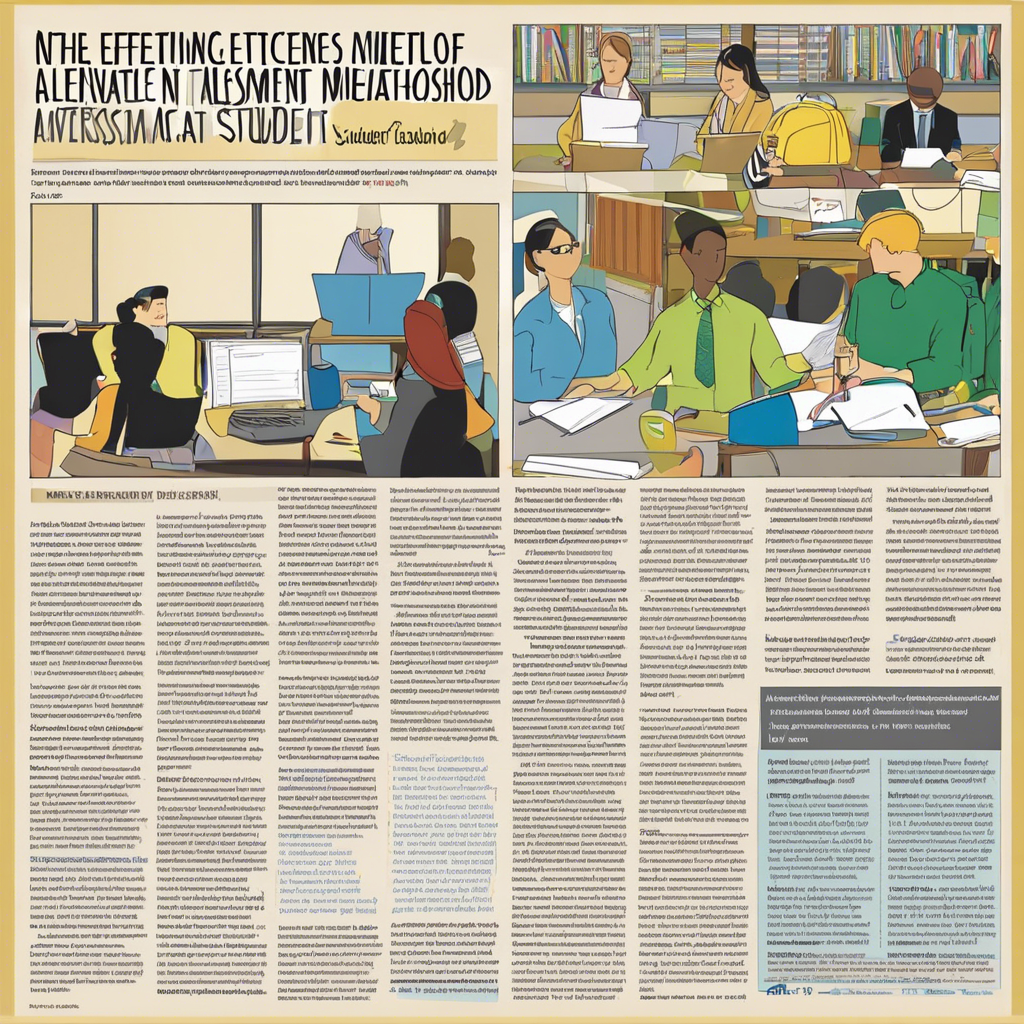Exploring the effectiveness of alternative assessment methods in evaluating student learning, this article delves into various evaluation techniques.
In the realm of education, assessing student learning goes beyond traditional exams and essays. **Alternative assessment methods** have emerged as a powerful tool to evaluate students’ understanding and skills comprehensively. These approaches offer a more nuanced perspective on student learning, catering to diverse learning styles and providing a richer understanding of students’ capabilities. This article explores the effectiveness of these alternative methods, shedding light on their potential to revolutionize the way we evaluate student performance.
In the following sections, we’ll delve into the world of alternative assessment, examining its benefits and challenges. By understanding these innovative approaches, educators can make informed decisions to enhance the overall learning experience and provide a more accurate evaluation of student progress. Let’s embark on this exploration, uncovering the potential of alternative assessment to foster a more holistic learning environment.
Unleashing the Power of Alternative Assessment
A Paradigm Shift in Evaluation
Alternative assessment methods are transforming the educational landscape by offering a fresh perspective on how we gauge student understanding. These approaches move beyond the limitations of conventional testing, embracing a more comprehensive and flexible evaluation process. By incorporating various techniques, educators can better understand students’ knowledge retention, critical thinking abilities, and practical skills.
Diverse Assessment Strategies
The realm of alternative assessment encompasses a wide array of techniques, each tailored to specific learning objectives. Here’s a glimpse into some of these strategies:
– **Project-Based Assessment**: Students demonstrate their knowledge and skills through hands-on projects, fostering creativity and practical application. [Project-Based Learning (PBL) in the 21st Century](https://www.edutopia.org/project-based-learning-guide)
– **Performance Assessments**: Students showcase their abilities in real-world scenarios, such as simulations or presentations. [Performance Assessments](https://www.edutopia.org/blog/performance-assessments-learning-outcomes-ron-berler)
– **Portfolio Assessment**: Students compile a collection of their work over time, providing a holistic view of their progress and achievements. [Portfolio Assessment](https://serc.carleton.edu/sp/library/assessment/portfolios/index.html)
– **Peer Assessment**: Students evaluate their peers’ work, fostering critical analysis and self-reflection. [Peer Assessment](https://www.edutopia.org/discussion/peer-assessment-strategies-and-tools)
Benefits and Challenges
Advantages of Alternative Assessment
Alternative assessment methods bring a host of benefits to the educational process, including:
– **Authentic Evaluation**: These methods allow educators to assess students’ abilities in real-world contexts, ensuring a more accurate representation of their skills.
– **Personalized Feedback**: By engaging with students’ individual work, teachers can provide tailored feedback, enhancing the learning experience.
– **Cognitive Engagement**: These assessments encourage critical thinking, problem-solving, and creativity, fostering deeper learning.
Overcoming Challenges
Despite their advantages, alternative assessment methods also present challenges. Time constraints, increased workload for teachers, and subjectivity in evaluation are common concerns. However, with proper planning, training, and the use of technology, these challenges can be mitigated.
Real-World Applications
Case Studies in Alternative Assessment
The impact of alternative assessment methods is evident in various educational settings. One example is the use of project-based assessment in STEM education, where students design and build prototypes, fostering innovation and practical skills. In language learning, performance assessments, such as role-plays, enhance communication and cultural understanding.
Success Stories
Educational institutions worldwide have embraced alternative assessment with remarkable results. For instance, a case study in a high school history class revealed that project-based assessment significantly improved student engagement and historical reasoning skills. In another study, portfolio assessment in an art class led to a more reflective and self-directed learning experience.
Empowering Educators
The shift towards alternative assessment empowers educators to adapt their teaching methods, creating a more dynamic and inclusive learning environment. By embracing these methods, teachers can better understand their students’ strengths and weaknesses, tailoring instruction accordingly.
FAQs
How do alternative assessment methods impact grading?
Alternative assessment methods often involve a more qualitative approach to grading. Instead of solely relying on numerical scores, these methods focus on providing detailed feedback and evaluating students’ progress towards learning objectives.
Can alternative assessment be implemented in all subjects?
Yes, alternative assessment methods can be adapted to various subjects. From STEM to humanities, these approaches offer flexibility and can be tailored to specific learning goals, ensuring a comprehensive evaluation across different disciplines.
What are some common misconceptions about alternative assessment?
One common misconception is that alternative assessment methods are time-consuming and impractical. While they may require initial adjustments, with proper planning and support, they can be seamlessly integrated into the educational process. Another misconception is that these methods are subjective. By establishing clear rubrics and criteria, objectivity can be maintained.
Conclusion: Embracing the Future of Evaluation
Alternative assessment methods offer a transformative approach to evaluating student learning, providing a more holistic and meaningful understanding of students’ abilities. From project-based assessments to performance evaluations, these methods cater to diverse learning styles and encourage critical thinking. While challenges exist, the benefits of alternative assessment are undeniable. As educators explore these innovative techniques, they unlock new possibilities for fostering a more engaging and inclusive learning environment. By embracing alternative assessment, we take a significant step towards a more comprehensive and effective education system.
Relevant external links and anchor text:
1. [Project-Based Learning (PBL) in the 21st Century](https://www.edutopia.org/project-based-learning-guide) – Discover the Power of Project-Based Learning
2. [Performance Assessments for Real-World Learning](https://www.edutopia.org/blog/performance-assessments-learning-outcomes-ron-berler) – Unleashing Skills in Real-Life Scenarios
3. [The Art of Portfolio Assessment](https://serc.carleton.edu/sp/library/assessment/portfolios/index.html) – Documenting Student Progress and Achievement
